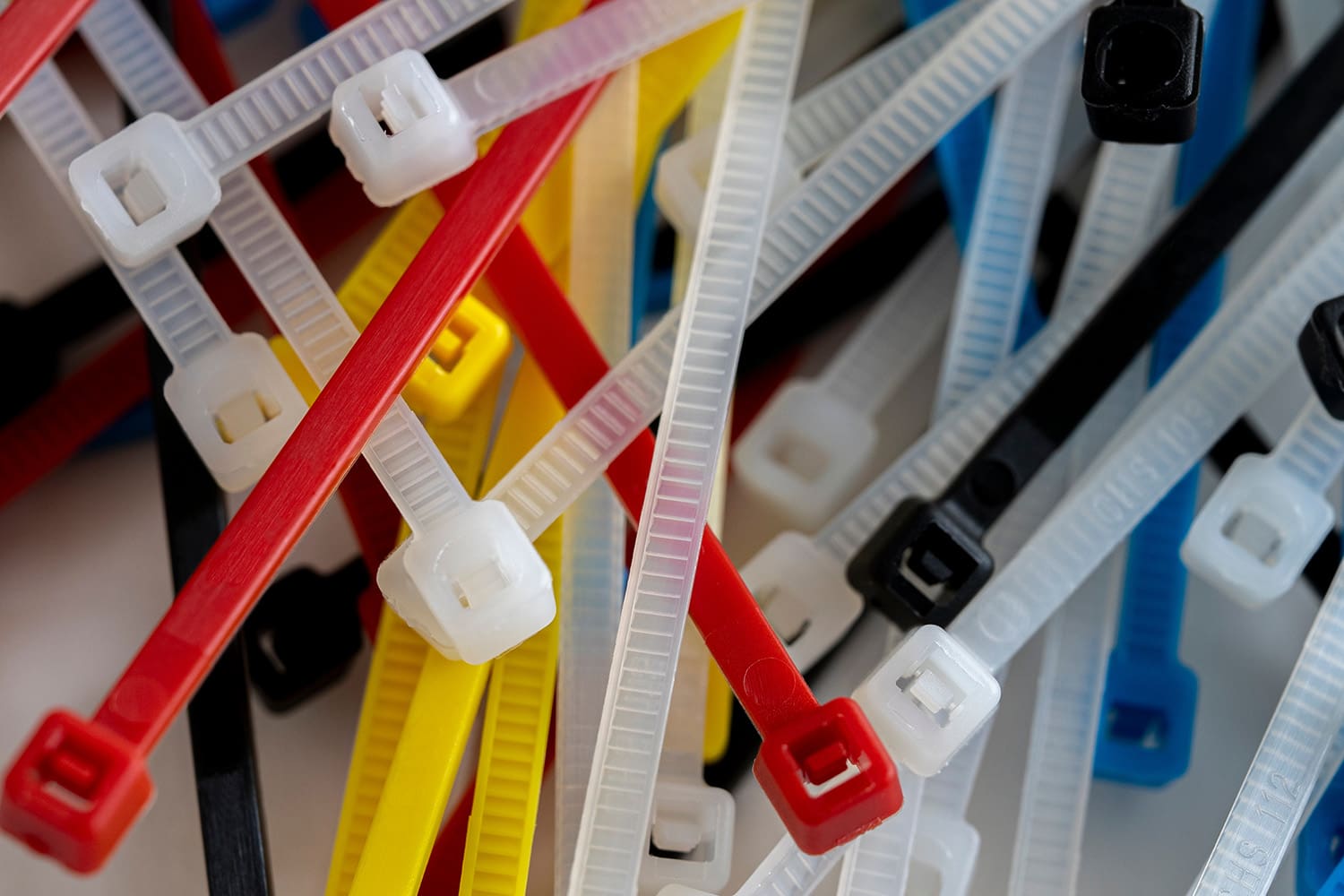Whether securing cables, bundling pipes, or even locking up a gate, zip ties are one of the most versatile tools available. But despite their common use in everyday projects and professional applications, one key question often arises: how strong are zip ties? The answer isn’t as simple as a single number!
It depends on various factors, including the material, size, and intended purpose of the cable tie. And whether you’re an electrician, contractor, or DIY enthusiast, understanding zip ties’ tensile strength and durability can ensure your projects are secure and long-lasting.
What Is Tensile Strength and Why Does It Matter?
Tensile strength refers to the maximum load a zip tie can withstand before breaking. It’s one of the most important characteristics to consider when asking “how strong are zip ties?” and choosing the right tie for a task. Tensile strength is typically measured in pounds, and most nylon zip ties start with a baseline tensile strength of about 18 pounds for miniature ties and can exceed 250 pounds for extra heavy-duty or stainless steel versions.
Here’s a quick look at some general tensile strength categories:
- Miniature Zip Ties: ~18–40 lbs.
- Intermediate/Standard Zip Ties: ~40–75 lbs.
- Heavy Duty Cable Ties: ~120–175 lbs.
- Extra Heavy Duty and Stainless Steel Zip Ties: 175+ lbs., with some rated over 250 lbs.
The stronger the zip tie, the more secure your fastening will be, especially in critical applications where safety or structural integrity is a concern.
Exploring the Different Types of Zip Ties
When asking, “How strong are zip ties?” it’s essential to understand that not all are made equal. Different materials and designs contribute to varying strength levels, UV resistance, and temperature tolerance. Let’s explore the most common types of zip ties and how they stack up in terms of strength and performance.
1. Cold Weather Cable Ties
Standard zip ties can become brittle and break under tension when working in frigid environments. Cold weather cable ties are engineered specifically to retain flexibility and strength in subzero conditions, often remaining reliable at temperatures as low as -40°F.
These ties are typically made from specially formulated nylon blends that resist cracking, making them ideal for outdoor winter projects, refrigeration systems, and arctic fieldwork.
These ties maintain dependable tensile strength and secure locking performance despite the cold. Whether you’re installing temporary holiday lighting or maintaining equipment in a freezing warehouse, cold weather ties provide peace of mind that your fastenings will hold up in the harshest climates.
2. Ladder-Style Cable Ties
If you’re looking for greater versatility and control, ladder-style cable ties offer a smart solution. Unlike the traditional solid body design, these ties feature evenly spaced notches along the strap, resembling a ladder. This design allows for more incremental adjustments and better grip when bundling cables or irregularly shaped objects.
Ladder-style ties also distribute pressure more evenly, which can be beneficial when working with delicate wires or components that could be damaged by over-tightening. While they may not always offer the same tensile strength as extra heavy-duty models, their adaptability makes them an excellent choice in electrical work, aerospace, or precision mechanical settings where customization and protection are key.
3. Heavy Duty Zip Ties
These ties are specifically engineered for more intense applications. Heavy-duty zip ties offer greater tensile strength, often up to 175 or 250 pounds, and are used in automotive, marine, and industrial settings. Some heavy-duty models go even further, with reinforced locking mechanisms and wider straps for increased holding power. These are often the strongest zip ties available in non-metallic options.
4. Metal Detectable Cable Ties
If you’re working in environments where contamination control is critical, metal detectable cable ties offer both peace of mind and performance. These teal blue ties are designed to stand out visually and can also be detected by metal sensors or picked up with magnets. This quality is ideal for food processing, pharmaceuticals, or cosmetics manufacturing.
Made from a unique blend of durable nylon and FDA-compliant metal additives, they provide a reliable and cost-efficient alternative to stainless steel for less demanding tasks. With six available lengths and full HACCP compliance, they help minimize product recalls and safety risks without compromising on quality.
How Strong Are Zip Ties in Different Environmental Conditions?
Another important aspect of zip tie strength is their performance in different environments. Standard nylon zip ties may become brittle or melt if you’re working in extreme temperatures, compromising their integrity. Look for high-temperature-rated ties that are engineered to maintain strength in hot or cold environments.
Similarly, UV resistance becomes a critical factor in outdoor projects. Over time, sunlight can weaken standard nylon ties, reducing their tensile strength and causing premature failure. In these scenarios, UV-rated or metal zip ties provide a longer-lasting solution.
Humidity and chemical exposure also affect performance. For applications involving chemical exposure or high moisture levels, stainless steel or specialty-coated zip ties offer superior resilience compared to plastic-based alternatives.
Choosing the Right Zip Tie for the Job
With so many options available, choosing the right zip tie boils down to matching your project needs with the tie’s specifications:
- For simple indoor cable management, use standard or miniature nylon zip ties.
- For outdoor use or direct sunlight exposure, go with UV-resistant zip ties.
- For automotive, HVAC, or marine work, choose heavy-duty cable ties with higher tensile strength.
- For industrial or hazardous environments, opt for stainless steel or extra heavy-duty ties.
When you consider all these factors, you get the answer to how strong zip ties are and ensure the tie you use is durable and reliable for your particular environment.
Trust Cable Ties That Go the Distance
Choosing the right zip tie means understanding its strength, material, and performance under stress. So, it’s easy to see why there are so many details that go into answering the question, “How strong are zip ties?” Whether you’re dealing with light wiring or securing components in extreme temperatures, selecting a high-quality tie can make all the difference.
Cable Ties Plus offers a wide range of reliable, heavy-duty, and UV-resistant ties to meet every need, from standard applications to the most demanding environments. Browse our collection today to find the strongest zip ties for your next project.


